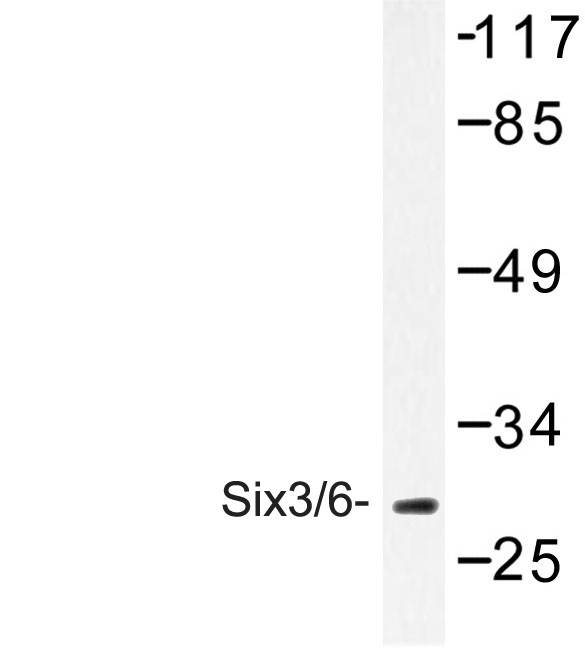SIX3 Rabbit Polyclonal Antibody
Other products for "SIX3"
Specifications
| Product Data | |
| Applications | IF, WB |
| Recommended Dilution | Western blot: 1/500-1/1000. Immunofluorescence: 1/50-1/200. |
| Reactivities | Human, Mouse, Rat |
| Host | Rabbit |
| Clonality | Polyclonal |
| Immunogen | Synthetic peptide, corresponding to amino acids 201-250 of Human Six3. |
| Specificity | This antibody detects endogenous levels of Six3 protein (35 KDa), and also detects Six6 protein (28 KDa). (region surrounding Asp228) |
| Formulation | Phosphate buffered saline (PBS), pH~7.2 State: Aff - Purified State: Liquid purified Ig fraction (> 95% pure by SDS-PAGE) Preservative: 0.05% Sodium Azide |
| Concentration | 1.0 mg/ml |
| Purification | Affinity Chromatography using epitope-specific immunogen |
| Conjugation | Unconjugated |
| Storage | Store undiluted at 2-8°C for one month or (in aliquots) at -20°C for longer. Avoid repeated freezing and thawing. |
| Stability | Shelf life: one year from despatch. |
| Predicted Protein Size | ~ 28 kDa (Six6); 35 kDa (Six3) |
| Gene Name | Homo sapiens SIX homeobox 3 (SIX3) |
| Database Link | |
| Background | The SIX proteins (sine oculis) are a family of homeodomain transcription factors that share a conserved DNA binding domain. Two of these family members Six3 and Six6 (also designated Optx2 and Six9) are required for the specification and proliferation of the eye field in vertebrates, and, therefore, are the vertebrate homologues most closely related to the Drosophila sine oculis protein, which has an essential role in controlling compound eye development. Six3 and Six6 expression largely overlap during development of specific tissues, such as retina, hypothalamus, and pituitary. The human Six6 gene maps to chromosome 14q22.3-q23. Haploinsufficiency of Six6 may cause several developmental disorders, including bilateral anophthalmia and pituitary anomalies. The gene encoding the human Six3 protein maps to chromosome 2p21-p22, a region associated with holoprosencephaly type 2 (HPE2). Deletion of Six3 may be associated with HPE2 disorder, a common, severe malformation of the brain that results from incomplete cleavage of the forebrain during early embryogenesis. |
| Synonyms | HPE2 |
| Reference Data | |
| Protein Families | Druggable Genome |
Documents
| Product Manuals |
| FAQs |
| SDS |
{0} Product Review(s)
0 Product Review(s)
Submit review
Be the first one to submit a review
Product Citations
*Delivery time may vary from web posted schedule. Occasional delays may occur due to unforeseen
complexities in the preparation of your product. International customers may expect an additional 1-2 weeks
in shipping.






























































































































































































































































 Germany
Germany
 Japan
Japan
 United Kingdom
United Kingdom
 China
China



